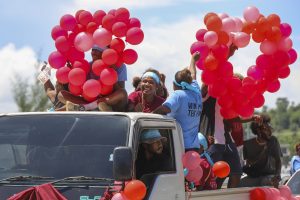Solomon Islands went to the polls today to elect a new government.
Prime Minister Manasseh Sogavare is seeking a fifth term in office. His OUR (Ownership, Unity and Responsibility) Party fielded a large slate of candidates and appears likely to take the lead when voting begins on April 17. However, new alliances and a host of independents (35 percent of all candidates) could complicate Sogavare’s attempts to form a new government.
Regardless of the outcome, the voting takes place at a critical juncture.
A Solomon Islands political scientist observed that the election is “perhaps the most important” since the country gained independence in 1978. International focus on the strategically-located Pacific nation (population 724,000) has spilled over into domestic politics, wrote Tarcisius Kabutaulaka, an associate professor at the University of Hawai’i at Mānoa.
Foreign policy is one of the main planks in the OUR Party platform. In a speech unveiling the manifesto, Sogavare said he would forge ahead with “look North,” a strategy aimed at deepening ties with Beijing. But he also assured party members that the government would build on relations with traditional partners like Australia.
Sogavare initiated the pivot to Beijing in 2019. Establishing diplomatic ties with China effectively ended a 36-year relationship with Taiwan. In 2022, “look North” entered a new phase when the Solomon Islands signed a security pact with China. According to a leaked draft, the agreement allows Beijing to send police or military forces “to assist in maintaining social order.”
The pact “sent shock waves” across the Pacific.
Australia had been Solomon Islands’ long-standing security partner deploying police officers during periods of ethnic conflict. Penny Wong, shadow foreign minister when the pact was signed in mid-2022, criticized Prime Minister Scott Morrison’s government saying, “this is the worst foreign policy blunder in the Pacific that Australia has seen since World War II.”
A month later, Wong was appointed foreign Minister in the new Labor government. One of her first overseas trips took her to Solomon Islands to reassure Sogavare that the “Pacific family” could take care of Honiara’s security needs.
A few days earlier, China’s Foreign Minister Wang Yi complained that media outlets were spreading “disinformation” about Pacific island security agreements. “China has come to the South Pacific region to build roads and bridges and improve the people’s lives, not to station troops or build military bases,” he said at a press conference in Papua New Guinea.
Infrastructure figures prominently in Beijing’s official statements on the region. When Sogavare visited China last June to inaugurate the new embassy, Xi Jinping told him: “We are both developing countries.” In an interview, Beijing’s ambassador in Honiara invited the Solomon Islands to “ride on the fast train of China’s development.”
The security agreement with China had the unintended consequence of hastening a U.S. return to Honiara, the capital. The New York Times reported that three American diplomats (and a dog) were working out of hotel rooms while the interim embassy was being prepared. On a visit to the capital, the Biden Administration’s Indo-Pacific coordinator Kurt Campbell indicated the U.S. had erred by shuttering the embassy in 1993. “We need to do more, and we need to do better,” he said at a press conference.
Campbell, who was recently confirmed as the second-ranking diplomat at the State Department, made it clear that the U.S. was looking for “more transparency” on the security pact which officials feared could lead to a military build-up in the Pacific.
As election day approached, the Solomon Islands appeared fully engaged with Pacific neighbors to the south. New Zealand helped by providing helicopters and a naval ship for security, while Australia chipped in with an aid package and aircraft to deliver ballots to outlying islands.

































